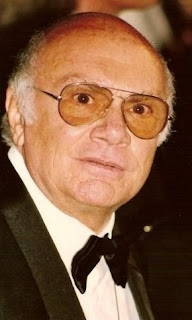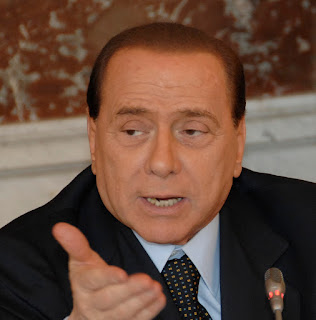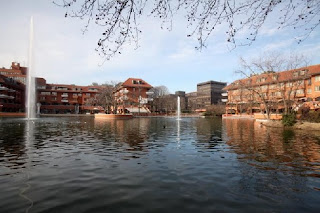Documentary style put him among greats of Italian cinema
 |
| Francesco Rosi |
The film director Francesco Rosi, one of Italy's most influential movie-makers over four decades, was born on this day in 1922 in Naples.
Rosi, who made his directing debut in 1958 and filmed his last movie in 1997, built on the fashion for neo-realism that dominated Italian cinema in the immediate post-war years and his films were often highly politicised.
Many of his works were almost pieces of investigative journalism, driven by his revulsion at the corruption and inequality he witnessed in the area in which he grew up, and the dubious relationships between local government and figures from the crime world.
His film
Hands Over the City, for example, starring Rod Steiger as unscrupulous land developer, sought to show how the landscape of Naples was shaped by greed and political interests. The film's disclaimer stated that “All characters and events narrated in this film are fictitious, but the social reality that created them is authentic.”
The Mattei Affair, which starred
Gian Maria Volonté - himself a political activist - tells the story of Enrico Mattei, a former Italian resistance fighter who rose to be head of ENI, the state-owned oil company, and died in a plane crash in Sicily. Conspiracy theorists linked his death with his attempt, in the middle of the Cold War, to break America's dominance of the Italian market, sign deals with Arab countries and even court Russia as a possible trading partner.
The project took Rosi's team into such dangerous political territory that one of his researchers, the journalist
Mauro de Mauro, disappeared. He was never found and it is presumed he was murdered for finding out too much about the case.
 |
| Gian Maria Volonté (centre) in a scene from The Mattei Affair |
Lucky Luciano, which featured Volonté and Steiger, was another movie filmed in the style of a documentary investigation, this time with its focus on the controversial role of a repatriated Sicilian-American Mafia boss in the Allied liberation of Sicily and the assault on the Italian mainland towards the end of the
Second World War.
Later, with
Illustrious Corpses, Rosi sought to shine light on the dark machinations of what would come to be known as 'The Strategy of Tension' during the 1980s, in which a series of deadly attacks carried out by right-wing extremists with the apparent collusion of the secret services would be blamed on activists on the hard left in order to derail an alliance being proposed between the Christian Democrat Party and the Communist Party.
Among his many awards was a
Palme d'Or at the 1972 Cannes Film Festival for
The Mattei Affair, a
Golden Lion at the 1963 Venice Biennale for
Hands Over the City and ten
David di Donatello awards from the Academy of Italian Cinema.
In 2012, he was awarded an honorary Golden Lion at the Venice Biennale for lifetime achievement and leaving "an indelible mark on the history of Italian film-making".
Rosi was born in
Montecalvario, a neighbourhood of central Naples that includes part of the Spanish Quarter, the Piazza Carità and the bustling Via Toledo. His father worked in the shipping industry, but also drew satirical cartoons, once earning a reprimand for his insulting depictions of
Benito Mussolini and
King Vittorio Emmanuel III.
 |
Giorgio Napoletana, a schoolfriend of Francesco Rosi,
who would go one to become President of the Republic |
Rosi went to college with
Giorgio Napolitano, who would later become Italian President, and they would remain lifelong friends. He studied law but his career took him in a different direction, first as an illustrator of children's books, then as a reporter with Radio Napoli.
The connections he made through the radio station led him into theatre work and film. After several films as assistant director, learning from
Ettore Giannini and
Luchino Visconti among others, he made his solo debut in 1958 with
La Sfida (The Challenge), an expose of corruption in the retail trade in Naples which quickly made clear Rosi's preoccupation with social justice and the complex labyrinths in Italian society.
His breakthrough in terms of international acclaim came in 1962 with
Salvatore Giuliano, a fictional exploration of the life of the Sicilian bandit of the title, his connections with the state and the church, and his role in fighting against communism in Sicily. Rosi's aim was to use the bandit’s life and death to convey the complexities of post-war Sicilian politics and society in which "resolving the truth was an impossibility."
Salvatore Giuliano won the
Silver Bear for Best Director at the Berlin International Film Festival in 1962 and established Rosi as one of the central figures of the post-neorealist phase in Italian cinema, along with
Gillo Pontecorvo, Pier Paolo Pasolini, the
Taviani brothers, Ettore Scola and
Valerio Zurlini.
Rosi’s later movies were accomplished productions but critics felt they lacked the power of his earlier work, although in his adaptation of
Christ Stopped at Eboli, Carlo Levi's memoir about his experiences as a doctor exiled in southern Italy for his anti-Fascist views, with Volonté in the title role, came close, winning a
BAFTA for Best Foreign Language Film.
After ending his career in film with
The Truce, based on holocaust survivor Primo Levi's memoir of returning to Italy after his liberation from Auschwitz, he returned to theatre, notably directing the Neapolitan comedies of
Eduardo De Filippo.
He spent his last years living in Rome on Via Gregoriana, near the Spanish Steps. He died in 2015 aged 92.
 |
| The Via Toledo in Naples has a typical flavour of the city |
Travel tip:
Montecal- vario, where Francesco Rosi was born, is said by many visitors to capture the essence of Naples. Bordered on one side by the
Via Toledo, the busy shopping street which links Piazza Dante with Piazza Trieste e Trento, it includes the part of the Spanish Quarter in which can be found the
Teatro Nuovo, an historic theatre originally built in 1724 and twice destroyed by fire. The theatre became famous for comic opera in the 19th century and in the 20th century staged the plays of the great Neapolitian comic dramatist, Eduardo de Filippo.
Hotels in Napoli by Booking.com
Travel tip:
The
Via Gregoriana, where Francesco Rosi spent his last years, is a street almost in the centre of Rome, very close to the tourist hubbub of
Piazza di Spagna and the Spanish Steps, yet still retains the air of a peaceful residential thoroughfare, the kind you might expect to find in a well-to-do suburb. Commissioned by
Pope Gregory XIII in 1575, it runs from the church of Trinita dei Monti, which looks down over Piazza di Spagna, towards Via del Tritone and has long been popular with artists and intellectuals.
Rome hotels by Booking.com
More reading:
Ennio Morricone, the film music maestro enters his 89th year
Anna Magnani - Oscar winning star of neo-realist fashion
The legacy of Fellini and La Dolce Vita
Also on this day:
1905: The birth of conductor Annunzio Mantovani
(Picture credits: Francesco Rosi by Georges Biard; Gian Maria Volonté by Pèter; Giorgio Napoletana by Ralf Roletschek; Via Toledo by Inviaggiocommons all via Wikimedia Commons)
Home













